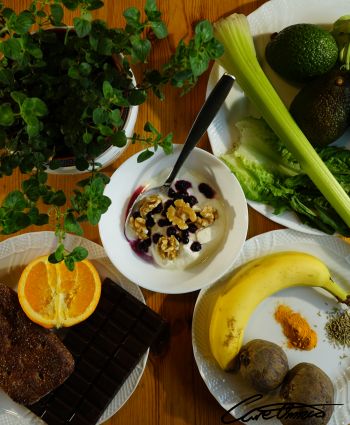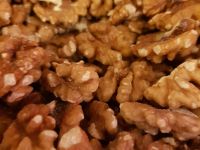21 Common Foods To Eliminate Brain Fog & Enhance Your Focus!

Eating the right foods provides a lot of benefits.
The foods we eat can have a big impact on the structure and health of our brains.
In addition to preventing disease, or keeping an eye on your weight, a healthy diet can also help your concentration and memory work better.
You don't have to make large changes at once. Small nutrition tweaks can help clear brain fog symptoms, boost energy, and increase productivity.
Did you know that your brain accounts for only about two percent of your total body weight? Still, it uses over 20% of all your energy!
The key is to keep your brain well-fed, nourished, and oxygenated with the right foods.
Therefore, we recommend that you eat the following at least once a week to keep your brain in the best condition!
Table of Contents
1. Avocado Sharpens Your Brain

Avocados are superfoods.
It contains monounsaturated, useful fats and is rich in vitamin E.
Vitamin E is a good antioxidant that prevents the free radical's harmful effects, among other things, on the brain.
Monounsaturated fats can help improve your concentration and memory.
It helps to improve communication between the nerve cells as well as blood circulation.
If the heart pumps around the blood properly in the body and the brain is well oxygenated, your brain gets sharper, and you can perform better.
2. Bananas Can Stimulate Your Memory
Bananas contain a lot of potassium. They also contain vitamin C, magnesium, and fiber.
Bananas also contain tryptophan, an amino acid that has been shown in studies to stimulate memory and improve mood.
Therefore, they are considered the perfect food for several brain functions. For instance, perfect before an exam.
Bananas contain vitamin B6, which contributes to the production of various neurotransmitters associated with concentration (dopamine, norepinephrine, and serotonin).
3. Beets For Learning And Concentration

Beets both lower blood pressure and increase blood flow to the brain.
This leads to increased oxygenation of the brain which is good for your memory, learning, and concentration.
This can also help you feel more focused and clearer.
The nitrate in beets improves the brains oxygenation which in turn can lead to slowing down age-associated dementia's progression.
Beets promote a healthy mind and your mood.
4. Blueberries Can Improve Cognitive Functions

Blueberries are one of our real super berries!
Incredibly, such a small berry can provide so many benefits. They are an excellent source of vitamin C and are full of antioxidants such as anthocyanins, polyphenols, and flavonoids.
The antioxidants in blueberries activate the enzymes in the brain and help with memory and concentration.
(They can even help with your eyesight).
Blueberries are believed to stimulate the ability to think.
To help in the formation of new brain cells.
But it also seems to slow down age-related deterioration of memory.
That is not all, research shows that blueberries can even improve or delay short-term memory loss and speed up thinking ability.
In only 12 weeks of drinking blueberry juice every day, people have shown improvements in cognitive function, blood flow to the brain, and activation of the brain.
In the United States, blueberries are sometimes called brainberries
.
There is a difference in the concentration of the good stuff in the wild European blueberry (bilberry) and the American, large blueberries.
We recommend eating a cup of wild European blueberries every day. Have it on your breakfast yogurt or put it in a smoothie.
5. Broccoli Can Prevent Memory Loss

Broccoli is one of the super vegetables you need to include in your daily diet.
Broccoli contains protein, few calories, and many vitamins (A, B, C, E, and K). Furthermore, they provide you with folates, flavonoids, and lutein.
Eating broccoli can prevent memory loss because of its power as an antioxidant.
The best way to contain all the nutrients in the broccoli is to steam it. But if you do cook the broccoli, make sure you don't cook it for more than three minutes.
6. Celery Protects From Inflammation
Celery contains luteolin.
Luteolin is a flavonoid with antioxidant properties that protect the brain from inflammation, cognitive aging, and neurodegenerative diseases, and it can greatly enhance memory, learning, and spatial awareness.
Consuming celery on a daily basis has been shown to reduce the risk of dementia.
Cedars-Sinai Medical Center in Los Angeles evaluated celery's effect on the brain. They find out that celery intake can help fight Alzheimer's.
7. Chicken Can Help You Think Faster And Clearer
To be able to concentrate, the brain needs to get enough protein.
When you eat protein, the body releases an amino acid called tyrosine.
Tyrosine synthesizes the neurotransmitters dopamine and norepinephrine, which help us think both faster and clearer.
Chicken contains high-quality proteins.
Eat it grilled, baked, or smoked.
Try to include chicken in your diet two to three times a week.
8. Coffee Can Make You More Alert
Coffee is one of the most common beverages around the world.
Coffee contains caffeine. Too much caffeine can have some negative effects. But when not overconsuming, it will make you more alert and sharpen your brain.
Coffee has been shown to have a positive effect on brain fog. One to two small or medium cups of coffee per day can help stave off some brain fog.
Most of us coffee drinkers can probably attest that a cup can sharpen your ability to think and your concentration.
But research also shows that caffeine has positive health effects on, among other things, the cognitive ability of the elderly, Parkinson's, and Alzheimer's disease.
9. Dark Chocolate Can Improve Your Memory And Concentration

Chocolate can be good for you. Who knew?
But for the chocolate to be useful, it must contain as much cocoa as possible.
Cocoa contains the nutrient theobromine, which has many benefits for your brain.
It means that dark chocolate is the best choice because it has the highest concentration of cocoa and, therefore, theobromine.
Theobromine can stimulate the nervous system, secrete endorphins, make you feel satiated, reduce anxiety, and can even help stabilize your mood.
The best part is that theobromine also increases blood flow to the brain. But it can also improve memory and concentration.
If you eat a small piece of dark chocolate before studying for a test or doing a task that needs your full attention, you could get better results.
10. Fish Can Improve Your Memory Cognitive Abilities
Cold-water fish, such as salmon, tuna, and mackerel, contain high levels of the fatty acids omega-3.
Omega-3s are beneficial for the central nervous system and can improve your memory and your cognitive abilities.
Omega-3s also improve your brain's ability to absorb oxygen and nutrients.
In adults, omega-3s help strengthen the central nervous system.
While in children, the omega-3s help develop it. It lays the ground for a healthy central nervous system and cognitive abilities.
Omega-3s can also help lower inflammation, protect cell membranes, improve cognition and memory, and support mood stability.
To get the most out of omega-3 benefits, you should eat the fish grilled, smoked, or baked.
The recommendation is to eat fish at least three times a week.
11. Kefir Has Restorative Properties
Kefir is a probiotic-rich food.
Incorporating probiotic-rich food in your diet will help balance gut flora and get rid of harmful bacteria.
An imbalance in the gut microbiome can lead to changes in mood, negatively affect learning and memory function, and may also cause inflammation in the brain.
Eating kefir can even improve your overall health.
Kefir contains active ingredients that have been known to fight infections and inflammation due to their antimicrobial and restorative properties.
12. Oranges Can Help You Process Information
Oranges are beneficial for several reasons.
It is rich in vitamin C, which is an essential nutrient and important for the maintenance of your brain cells, among other things.
Vitamin C will also provide you with the important nutrient called potassium.
With potassium intake, signal transmission in the brain can be improved and you can be able to handle a larger amount of information.
Other sources of potassium are bananas, apricots, potatoes, legumes, and tomatoes.
13. Oregano Decrease Brain Fog
Oregano is one of the best sources for helping alleviate brain fog.
Research shows luteolin, which you can find in oregano, is a flavonoid, antioxidant and anti-inflammatory agent. It has numerous properties that can decrease brain fog.
Oregano also prevents inflammation in the body. Inflammation can be linked to just about any disease humans can suffer from.
The good thing is that it doesn't matter if you eat your oregano fresh or dried. The good effect applies to both.
14. Rosemary Improves Your Memory
Rosemary has long been associated with improving memory.
In Shakespeare's Hamlet, Ophelia said: "There's rosemary, that's for remembrance"
Rosemary is high in carnosic acid, a phytochemical that enhances learning and spatial memory, reduces oxidative stress, and prevents neuron damage.
It is even believed that rosemary can protect against Alzheimer’s and other neurodegenerative diseases.
15. Sauerkraut For Beneficial Bacterias
Sauerkraut is very nutritious and improves your digestion by being probiotic.
Incorporating probiotic-rich food in your diet will help balance gut flora and get rid of harmful bacteria.
An imbalance in the gut microbiome can lead to changes in mood, negatively affect learning and memory function, and may also cause inflammation in the brain.
By eating a few tablespoons of sauerkraut at each meal, you will provide your intestines with beneficial bacteria, which are great for your brain health.
16. Spinach And Other Leafy Green Vegetables Can Increase Focus

Green leafy vegetables contain several of the vitamin Bs, which help several brain functions and can also increase your ability to concentrate.
Spinach is considered to be one of the healthiest foods there is.
It contains many beneficial nutrients. For instance, spinach contains a lot of iron which helps your logical thinking, learning, and memory.
Spinach also contains the nutrient lutein. Lutein has beneficial effects on the brain, where it’s associated with improved cognitive performance and protect the brain from free radical damage and inflammation.
17. Turmeric For Your Memory
Turmeric is well known for containing powerful antioxidants that protect your body.
Curcumin is the main, active ingredient in turmeric, and what gives turmeric its yellow color.
A relatively high single dose of curcumin increases blood flow to the brain. It means that it becomes better oxygenated.
A study made on people who suffered from a milder form of memory loss or poorer memory got a better memory of just consuming turmeric.
The curcumin in turmeric has been shown to protect against cognitive decline and lessen impairment in traumatic brain injury, and it may even stimulate new brain cell production.
18. Walnuts For Your Concentration And Attention

Have you ever noticed that walnuts have the same shape as the brain?
Some mean that it is because they are so great for mental functions, such as concentration and attention.
Walnuts are full of omega-3 fatty acids and vitamin E.
Vitamin E can slow down memory loss in the elderly.
The nuts also contain beneficial fats that can repair myelin. Myelin insulates nerve pathways. When this isolation is improved, information is sent faster between nerve cells.
Walnuts are not the only nuts that can help you. Even almonds and peanuts contain good nutrients.
19. Water Is Vital For You
Our brain consists of more than 85% water. That's why it's not surprising that you will be affected if you do not have the right fluid balance in the body.
Water plays a major role in brain functions.
Dehydration results in a deterioration of the brain's energy production. Which means that you get headaches, poor ability to concentrate, and short-term memory deterioration.
Drinking adequate amounts of water every day will help increase mental clarity and concentration, help prevent headaches, and help remove cellular waste that accumulates in the blood that can travel to the brain.
20. Wholemeal Can Help You Concentrate
Wholemeal contains tryptophan, which is absorbed in the brain to help produce serotonin.
This neurotransmitter evokes feelings of relaxation and drowsiness. This might not feel right when it comes to focus, but don’t worry.
What happens is that serotonin can keep stress levels at a reasonable level and therefore help you concentrate better.
Choose a high-fiber variety of bread. White bread makes you perform worse because it gives a strong and relatively short sugar surcharge.
It means that you quickly feel tired when the sugar from the fast carbohydrates drops.
With whole grain products, you provide your brain with energy that lasts longer and improves your judgment and concentration.
21. Yogurt Can Improve Memory And Attention
Dairy products contain calcium and other nutrients that are good for your health.
But full-fat yogurt is recommended for those who have trouble concentrating or paying attention.
It is due to an antioxidant called tyrosine, which helps produce neurotransmitters that improve memory and attention.
Foods To Avoid For A Healthy Brain!
There are not just foods you should eat to nourish your brain, there are also foods you should avoid.
Foods you should avoid or at least cut down on are, for example, sugar, gluten, and all fried foods.
Avoid sugar
A high-sugar diet can lead to excess glucose in the brain, which studies have linked to memory impairments and learning problems.
Our brain is activated by large amounts of sugar. In studies, a connection has been seen between large amounts of sugar in concentrated form and hyperactivity, such as ADHD.
There are actually no positive effects of eating sugar on your health.
Avoid gluten
Gluten takes time for the intestine to break down, and inflammation can then form that will affect the intestine and then spread to the brain.
The gut and the brain have a close connection, and the inflammation releases specific hormones that affect the brain and psyche, such as anxiety and depression.
Studies have shown that people with autism should avoid the proteins in gluten. But also casein. Casein in dairy products.
Studies in autistic children and young people have shown positive effects on the brain of those who go on a gluten- and casein-free diet. The symptoms have not disappeared, but have been alleviated.
Avoid fried foods
Eating lots of fried foods have been linked to lower learning and memory.
Just like gluten, these foods can cause inflammation, which can damage the blood vessels that supply the brain with blood.
Studies have shown that people that often eat fried foods are more likely to develop depression.
Conclusion: Eat Smart And Sharpen Your Brain
It is not only your body that needs energy to function optimally, so does your brain.
Some foods are extra beneficial for the brain, which reduces the risk of certain diseases, improves the ability to concentrate, and increases blood flow to the brain for maximum function.
Rather than focusing on one food, try to combine several of these options every time you eat.
The foods we eat are broken down into nutrients, taken up by the bloodstream, and transported to our brain.
So remember this next time you reach for a brownie. The ingredients will actually become part of your brain.
You should strive to eat well everyday and try to nourish your brain. Give yourself that, because you are worth it!
